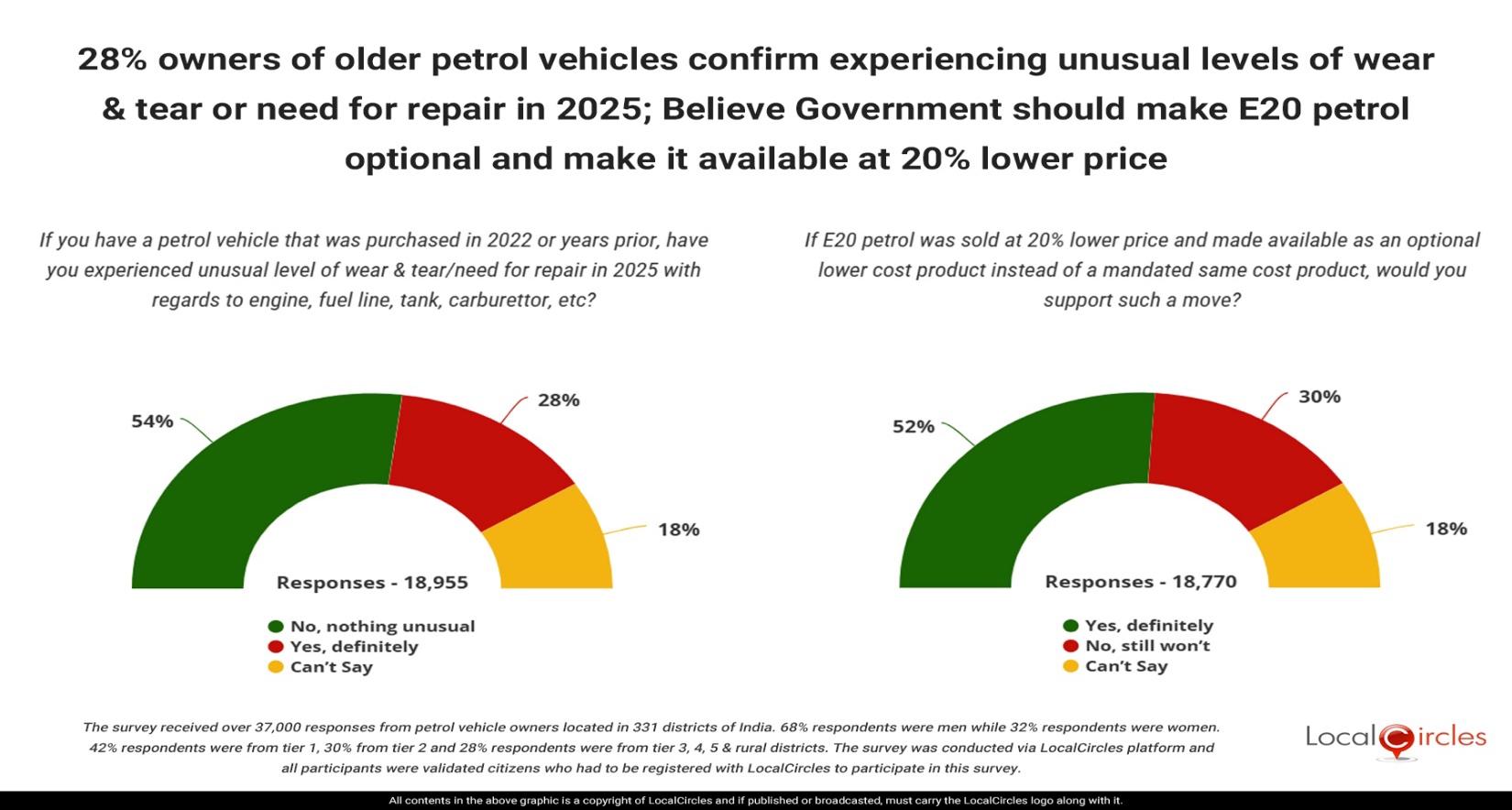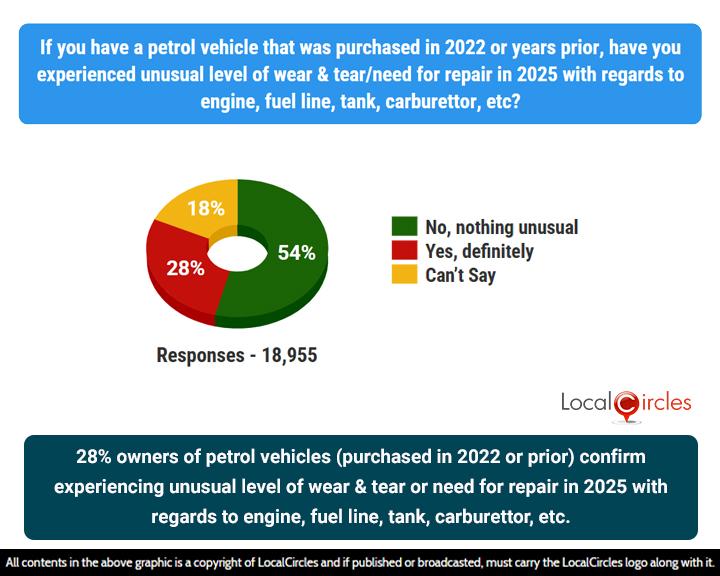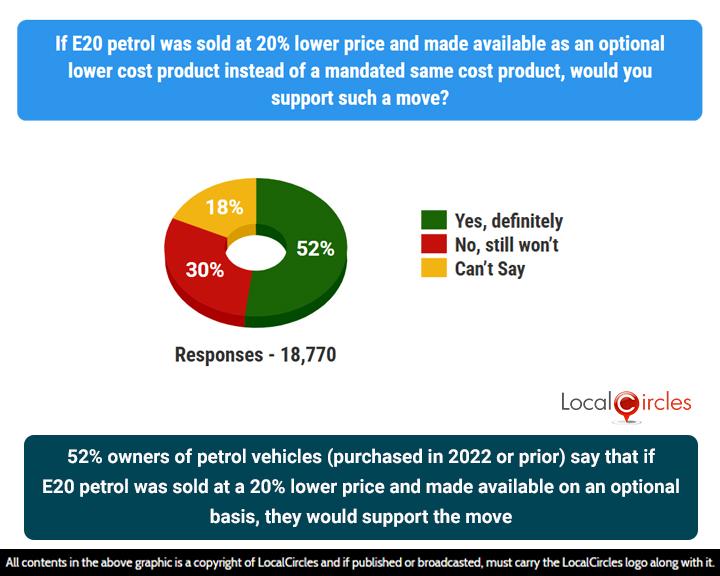28% owners of older petrol vehicles confirm experiencing unusual levels of wear & tear or need for repair in 2025; Believe Government should make E20 petrol optional and make it available at 20% lower price
August 27, 2025, New Delhi: The issue of 20% ethanol blended petrol or E20 has become a huge talking point in social media over the last 3 weeks with many owners of old petrol vehicles also sharing apprehensions about possible damage to their vehicles as they are not designed for E20 petrol. Late last week a PIL was filed in the Supreme Court challenging the Government’s push for nationwide implementation of E20 petrol.
The Union Minister of Road Transport and Highways Nitin Gadkari has dismissed concerns over 20% ethanol-blended petrol which has been rolled out, challenging critics to produce even a single instance of it causing adverse impact on vehicles, as many old vehicle owners are claiming. “By putting 20% ethanol-blended petrol, has there been any car in the country that has faced issues? Just name one,” Gadkari stated recently at a public forum, asserting that the Society of Indian Automobile Manufacturers (SIAM) and the Automotive Research Association of India (ARAI) have issued statements supporting the rollout. The Ministry of Petroleum and Natural Gas too had earlier issued a detailed clarification dismissing such fears as “largely unfounded and not supported by scientific evidence or expert analysis.”
Contrary to government’s claim, there appears to be plenty of evidence to demonstrate that owners of vehicles not compatible with E20 petrol could face problems not just in terms of mileage but also vehicle fitness after use of E20 petrol. An owner’s manual taken off Jeep’s site and shared on Team-BHP.com states: “The manufacturer recommends that your vehicle be operated on fuel containing no more than 10% ethanol.” It also cautions: Use of fuel with ethanol content higher than 10% may result in engine malfunction, starting and operating difficulties, and material degradation. These adverse effects could result in permanent damage to your vehicle.”
While praising E20 for its environment benefits, TVS Motors on its website cautions that “not every engine on a vehicle on the road today is made to run on E20. To guarantee compatibility, manufacturers must alter engines and fuel systems. Upgrades or retrofits may be necessary for older vehicles.” It has pointed out that “the qualities of pure gasoline and ethanol differ, so adapting engines to run on, say, E20 fuel (20% ethanol and 80% gasoline combination) usually involves multiple changes and considerations.” Some significant adjustments that auto manufacturers may need to make include:
- Compatibility of materials: Must make sure that parts of engines, including gasoline tanks, seals, gaskets, and fuel lines, are constructed of materials suitable for use with ethanol.
- Fuel System modifications: It is also necessary to modify the fuel delivery system, which includes the pumps and injectors, to accommodate the unique characteristics of E20. Because it contains more oxygen than gasoline, ethanol burns a little differently as compared to gasoline. Engine control systems require calibration to maximise E20 performance.
- Engine modifications: To achieve the best possible air-fuel mixture and ignition timing for E20, the engine control unit (ECU) needs to be recalibrated.
- Sensor modifications: It might be necessary for some sensors, including oxygen and fuel composition sensors, to work with ethanol mixtures. These sensors are essential for giving the ECU feedback so that the engine can be controlled precisely.
- Testing for durability: To guarantee that every part of an engine built for use with E20 can endure the long-term corrosive effects of ethanol, the engines must go through extensive durability testing.
What could tip the scale is the latest media report based on a RTI response from Indian Oil Corporation, the largest state-owned oil marketing company, that both the XP95 and standard petrol sold in Kolkata have 20% ethanol by volume. Which, in effect, means that even the premium fuel sold is not pure petrol, but has a 20% ethanol mixture.
With many consumers using social media to discuss reduced mileage and other issues since the introduction of E20 petrol, LocalCircles had recently conducted a survey which revealed that 2 in 3 vehicle owners with a vehicle that was purchased in 2022 or earlier say their vehicle’s fuel efficiency/mileage has reduced in 2025.
In a follow-up survey, LocalCircles has strived to find out whether there has been any impact on the fitness of the vehicles and what solution do they seek from the government. The survey received over 37,000 responses from petrol vehicle owners located in 331 districts of India. 68% respondents were men while 32% respondents were women. 42% respondents were from tier 1, 30% from tier 2 and 28% respondents were from tier 3, 4, 5 & rural districts.

28% of owners of petrol vehicles (purchased in 2022 or prior) confirm experiencing unusual levels of wear & tear or need for repair in 2025 with regards to engine, fuel line, tank, carburetor, etc.
The survey first asked petrol vehicle owners, “If you have a petrol vehicle that was purchased in 2022 or years prior, have you experienced unusual level of wear and tear/ need for repair in 2025 with regards to engine fuel line, tank, carburetor, etc.?” Out of 18,955 who responded to the question 54% indicated “no, nothing unusual”; 28% of respondents indicated “yes, definitely” and 18% of respondents did not give a clear answer. To sum up, 28% owners of petrol vehicles (purchased in 2022 or prior) confirm experiencing unusual levels of wear & tear or need for repair in 2025 with regards to engine, fuel line, tank, carburetor, etc.

52% of owners of petrol vehicles (purchased in 2022 or prior) say that if E20 petrol was sold at a 20% lower price and made available on an optional basis, they would support the move
With government set on E20 petrol and many petrol vehicle owners facing prospect of faster wear and tear of their vehicle besides less mileage, the survey asked, “If E20 petrol was sold at 20% lower price and made available as an optional lower cost product instead of a mandate same cost product, would you support such a move?” The question received 18,770 responses with 52% stating “yes, definitely” they would support a move for E20 petrol at discounted price or optional use; 30% of respondents stated “no, still won’t” an 11% of respondents did not give a clear answer. To sum up, 52% of owners of petrol vehicles (purchased in 2022 or prior) say that if E20 petrol was sold at a 20% lower price and made available on an optional basis, they would support the move. Interestingly, in the national capital an Indian Oil Corporation petrol pump has prominently displayed a hoarding that pure premium petrol is available. A consumer has however shared on ‘X’ that the premium pure petrol has been priced at INR 160/ ltr “this is just ridiculous”.

In summary, while the government is right to explore and exploit potential of ethanol blended petrol as transport fuel not only to reduce dependence on fossil fuel, which is mostly imported, the authorities need to be sensitive to the plight of tens of millions of owners of petrol vehicles which are not equipped to handle E20 petrol. As the survey shows, 28% of owners of petrol vehicles, purchased in 2022 or prior, confirm experiencing unusual levels of wear and tear or need for repair this year, whether it is the engine, fuel line, tank, carburetor, etc. Given the prospect of a faster wear and tear of vehicles, 52% owners of petrol vehicles (purchased in 2022 or prior) say that if E20 petrol was sold at a 20% lower price and made available on an optional basis, they would support the move.
LocalCircles will share the survey findings with the key ministries with the expectation that the plight of old petrol vehicle owners will be heeded and they will be able to access 10% ethanol blended petrol and E20 petrol will not be the only option offered to vehicle owners. For the future, automobile manufacturers should also be directed to make vehicles suitable for E20 and higher ethanol blended petrol. In the interim, petrol vehicle owners not desiring to buy blended fuel as their vehicle is not compatible, should be offered the fuel at a more reasonable price or given the pure petrol also at affordable prices. Not at the inflated price as seen at a petrol pump in Delhi.
Survey Demographics
The survey received over 37,000 responses from petrol vehicle owners located in 331 districts of India. 68% respondents were men while 32% respondents were women. 42% respondents were from tier 1, 30% from tier 2 and 28% respondents were from tier 3, 4, 5 & rural districts. The survey was conducted via LocalCircles platform, and all participants were validated citizens who had to be registered with LocalCircles to participate in this survey.
About LocalCircles
LocalCircles, India’s leading Community Social Media platform enables citizens and small businesses to escalate issues for policy and enforcement interventions and enables Government to make policies that are citizen and small business centric. LocalCircles is also India’s # 1 pollster on issues of governance, public and consumer interest. More about LocalCircles can be found on https://www.localcircles.com
For more queries - media@localcircles.com, +91-8585909866
All content in this report is a copyright of LocalCircles. Any reproduction or redistribution of the graphics or the data therein requires the LocalCircles logo to be carried along with it. In case any violation is observed LocalCircles reserves the right to take legal action.


